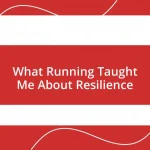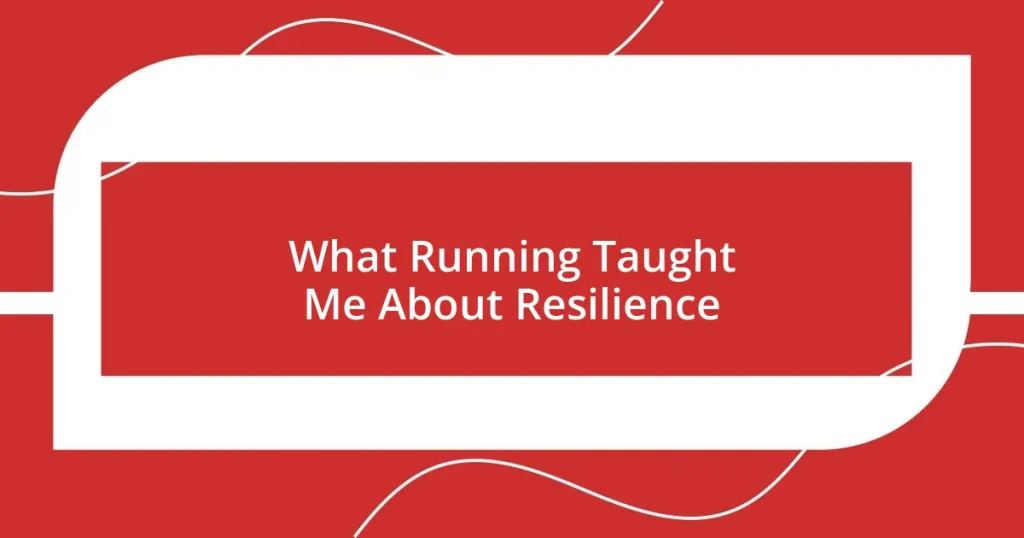Key takeaways:
- A relay race embodies teamwork, involving baton exchanges and strategic communication among team members.
- Team running fosters motivation, accountability, and lasting bonds through shared experiences and training.
- Competing in relays enhances personal growth by building resilience, confidence, and trust in teammates.
- Overcoming race challenges requires adaptability, mental preparation, and support from teammates during tough moments.

What is a relay race
A relay race is a team event in track and field where members compete in succession, passing a baton to one another. I still remember the first time I watched a relay; the energy was contagious as each runner approached the exchange zone, adrenaline pumping. The urgency of the baton handoff is like a dance, and witnessing that seamless transition really captures the essence of teamwork.
In a standard relay, teams typically consist of four runners, each covering a specific distance, usually 100 to 400 meters. I’ll never forget the moment I anxiously awaited my turn, heart racing as I cheered for my teammates, knowing my performance would contribute to our collective success. Isn’t it fascinating how individual effort blends into a unified achievement?
The thrill of a relay lies not just in speed but also in strategy and timing. I’ve learned that it’s pivotal to practice, as the baton exchange often makes or breaks a race. Have you ever considered how much trust is involved in passing a baton? It’s more than just running; it’s about synchronizing your rhythm with someone else’s, and I find that to be a unique metaphor for life itself.
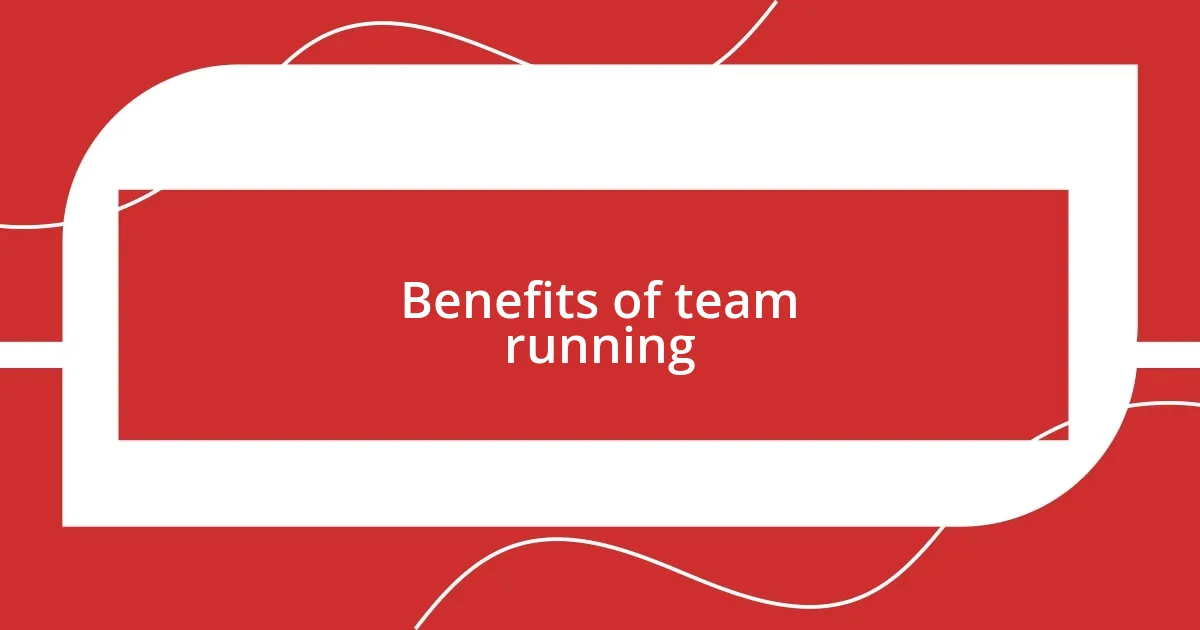
Benefits of team running
Team running offers a unique camaraderie that fosters deep connections among teammates. I’ll always cherish the moments spent in practice, laughing and supporting each other through tough workouts. The sense of shared purpose is palpable; it’s inspiring to know you’re all working towards a common goal, relying on one another to give your best.
Here are some key benefits of team running:
- Motivation: Having teammates encourages individuals to push themselves harder than they might alone.
- Accountability: You’re less likely to skip training when someone else is counting on you to show up.
- Shared Experience: The highs and lows of training and racing create lasting memories and bonds.
- Diverse Skills: Each member brings unique strengths, allowing the team to learn from one another.
- Boosted Confidence: Celebrating each other’s successes builds confidence in individuals, enhancing overall performance.
Running as part of a team is like cultivating a small community where everyone’s progress fuels your enthusiasm. I often think back to those moments when we crossed the finish line together, exhilarated and exhausted, our shared laughter ringing in the air. Together, we weren’t just running; we were creating an experience—one filled with encouragement and unbreakable ties that went beyond the race itself.

Personal growth through competition
Competing in a relay race transformed my understanding of resilience. When the pressure mounted, especially during a close race, I discovered an inner strength that I never knew I possessed. It was in those moments, sprinting my heart out and feeling my legs heavy with fatigue, that I realized pushing through discomfort often leads to profound personal breakthroughs.
The beauty of competition lies in how it challenges our limits. Before my training began, I doubted my ability to keep pace with my team. Yet, with every practice and every race, I saw my confidence build. I learned that competition can be a mirror, reflecting not just our physical capabilities but also revealing the tenacity we didn’t know was there.
One of the most significant lessons I gained from running a relay was the power of trust within competition. Handing over the baton to my teammate felt like a leap of faith—every time we raced, it was crucial to invest my trust in their abilities. This exchange taught me how vital trust and collaboration are, not only in sports but in every aspect of life.
| Personal Growth Aspect | Impact of Relay Racing |
|---|---|
| Resilience | Learned to push through physical discomfort, discovering untapped inner strength. |
| Confidence | Grew self-esteem as I proved my capabilities through competition. |
| Trust | Realized the importance of trusting teammates, fostering deeper connections. |
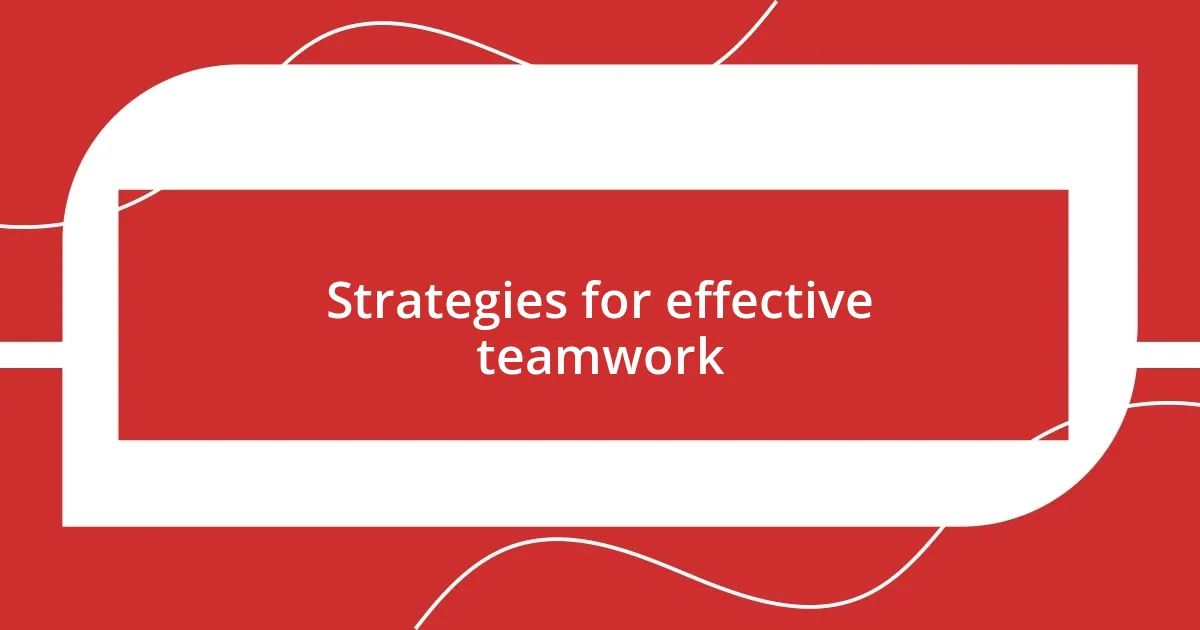
Strategies for effective teamwork
Effective teamwork is all about communication. I remember one practice when we had a big discrepancy between our individual lap times, which led to confusion about our overall strategy. We held a quick huddle, discussing our strengths and weaknesses. That open conversation not only clarified our roles but also energized us, aligning our collective efforts towards a unified goal. Have you ever found that a simple chat can change the course of your teamwork?
Trusting each other is another vital strategy. In our relay, the baton handoff was a moment of sheer tension, but I learned to rely on my teammates completely. It was fascinating—when I let go and trusted my partner to take the baton smoothly, I was rewarded with a surge of confidence. The importance of this trust extended beyond racing; it reminded me how crucial it is to rely on others in everyday situations.
Lastly, celebrating small victories together helps solidify team bonds. I distinctly recall our team gathering after a practice run to celebrate improved lap times. Sharing those moments of triumph, whether big or small, nurtured a culture of positivity. It’s the little wins that add up, reinforcing our commitment to support each other. Have you ever experienced that uplifting feeling when your teammates recognize your hard work? It truly makes all the difference.
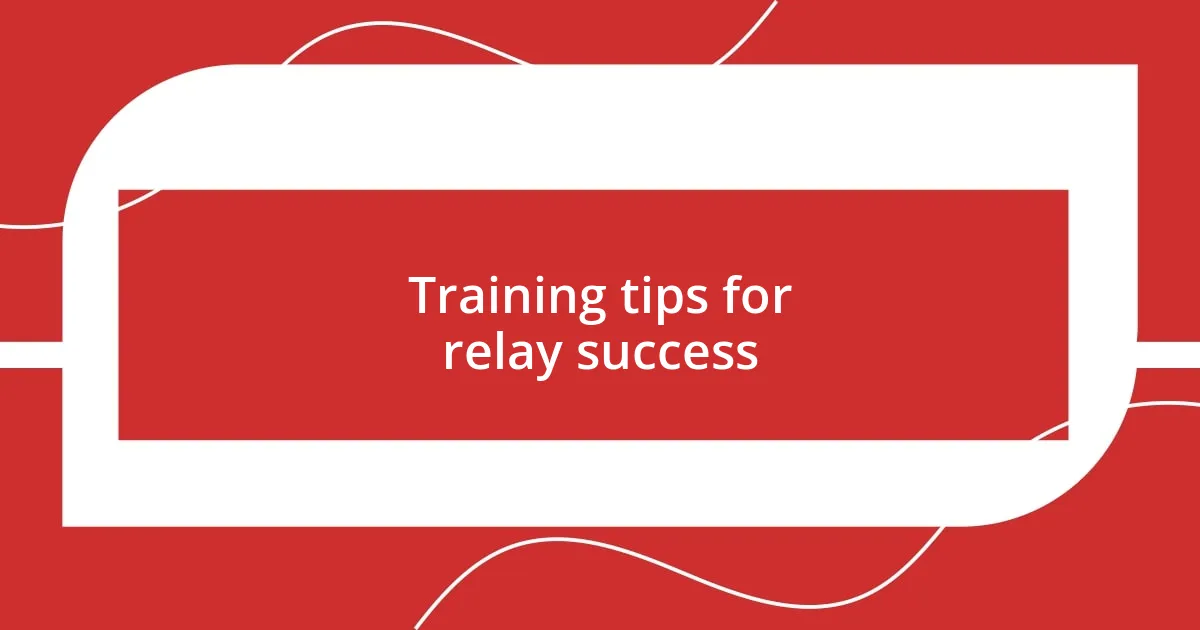
Training tips for relay success
Training for a relay race is more than just physical; it’s about honing your skills in transition. I remember my first practice when I fumbled the baton—my heart raced, and I felt embarrassed. But instead of dwelling on the slip-up, we took time to rehearse our exchanges repeatedly. Practicing those handoffs turned out to be crucial; each attempt built our confidence and rhythm as a team. Have you ever noticed how practice transforms anxiety into fluidity?
Incorporating interval training was another game-changer for me. I learned to alternate between high-intensity sprints and recovery periods, mirroring the bursts of speed required in a relay. This method not only improved my endurance but also sharpened my focus during the exchanges with teammates. I vividly remember the exhilaration of nailing that final sprint, knowing that my training was paying off. Isn’t it fascinating how structured workouts can lead to tangible results?
Finally, mental preparation cannot be overlooked. Visualization became a part of my routine; I would imagine the race from start to finish, picturing every handoff and moment. Before races, I would take deep breaths and focus on calming my nerves. This practice helped transform my anticipation into excitement, allowing me to embrace the thrill of competition. Have you ever found that mentally rehearsing a challenge made you more prepared? It really does set the stage for success.
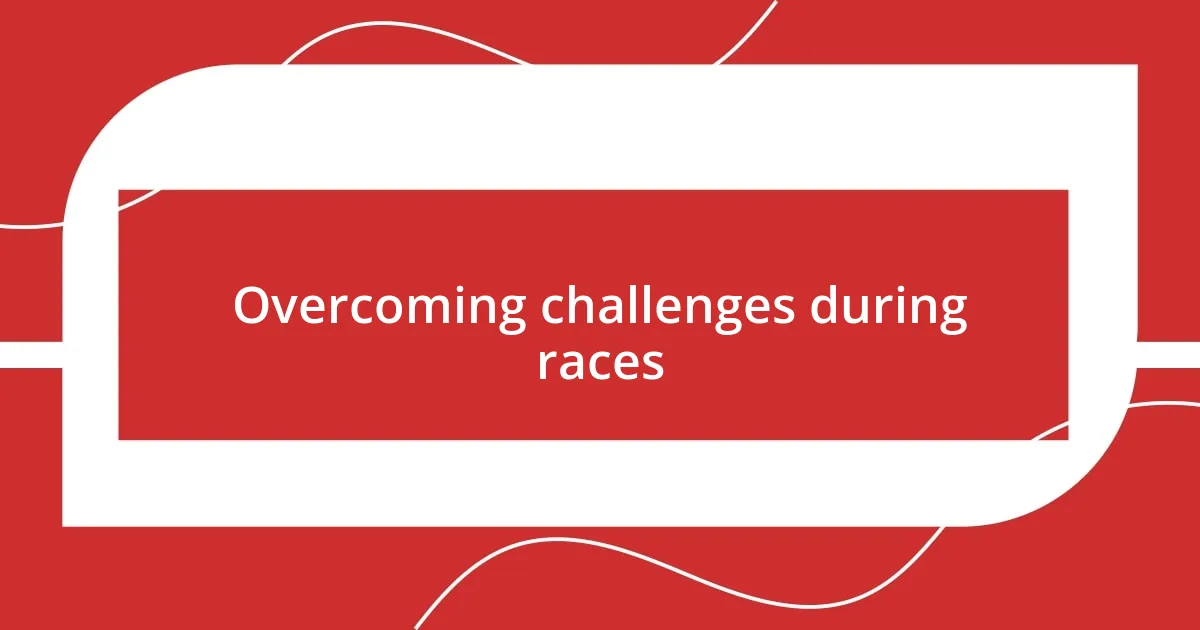
Overcoming challenges during races
During relay races, challenges can arise unexpectedly, pushing you to your limits. I vividly remember one race where a teammate sprained their ankle just before their leg. Panic set in, but rather than succumbing to fear, we quickly recalibrated our strategy. Having to shift responsibilities not only tested our adaptability but also deepened our resolve to succeed as a unit. Have you ever found yourself in a tight spot and had to innovate on the fly?
Another obstacle often comes from within—self-doubt can creep in right as you’re about to hit the track. I recall standing at the starting line, heart pounding, questioning if I was really prepared. It took a moment of deep breathing and reminding myself of the hours of practice to push those thoughts aside. Embracing that self-talk shifted my mindset significantly, allowing me to focus on the race ahead rather than my insecurities. How do you silence those nagging doubts when it matters most?
The physical exertion of the race itself can be daunting, especially during the final leg. I learned this when I pushed through fatigue and discomfort while sprinting towards the finish. As I approached, my body screamed for me to slow down, but the energy from my teammates and the echo of their cheers compelled me forward. It was incredible how that external motivation pulled me through a moment I thought I might not conquer. Have you ever experienced the rush of adrenaline that helps you overcome what feels impossible? It’s a powerful reminder of how much we can achieve when we truly commit.

Reflections on my relay experience
Reflecting on my relay experience, I find myself thinking about the connections forged with teammates. It’s remarkable how sharing a goal can ignite a sense of belonging. I remember one particular race when we shared nervous glances before the start—I could feel the collective heartbeat of our team. That moment of unity was special; it created not just alliances but a bond that lasted beyond the track.
As I relive those exhilarating moments, I’m reminded of the lessons patience taught me through each handoff. I once made a critical mistake by rushing during an exchange, resulting in a fumble that momentarily shattered my confidence. But it was my teammates who rallied around me, encouraging me to approach the next transition with calm and precision. Have you ever needed that support from others to overcome your moments of frustration? I learned that vulnerability can strengthen us and make victories sweeter.
Finally, reflecting on the emotions that surged within me during the race, I can’t help but think about the thrill of crossing the finish line. The noise of cheers blurred as I pushed through the last stretch, solely focused on my goal. That sense of triumph encapsulated all the hard work, and I couldn’t help but smile—a smile that reflected teamwork, resilience, and joy. Don’t you find that the best moments often come when you least expect them?

